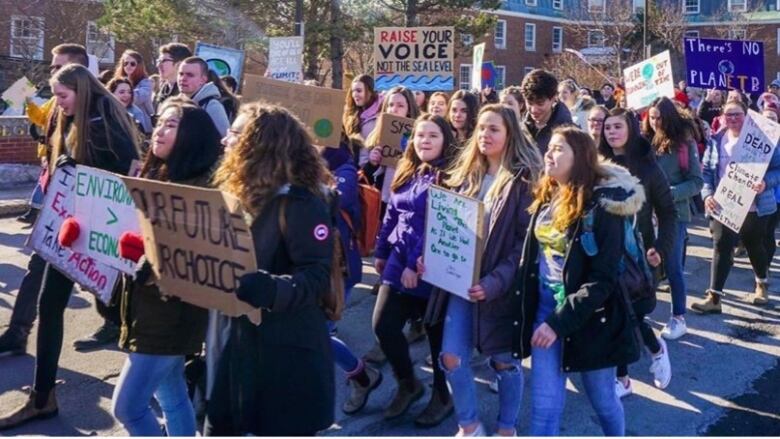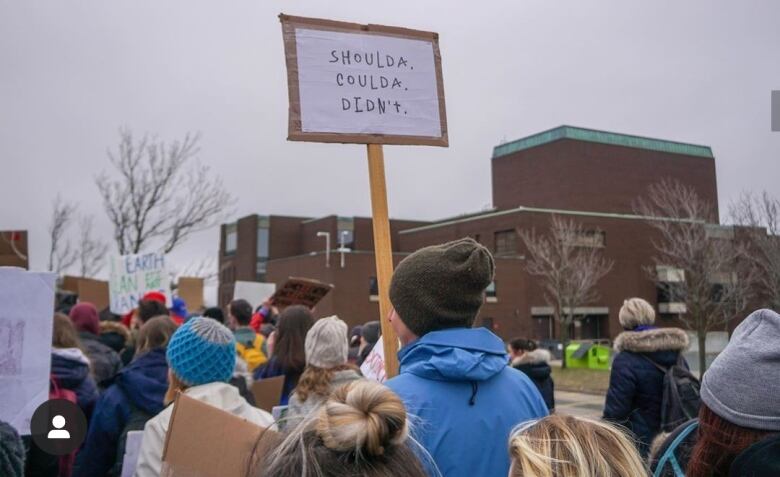N.L. youth are leading the way on climate change activism
Erin Lee and Alice Ferguson O'Brien say young people are making their voices heard

It's a Friday morning in May, and the streets of St. John's are an incredible sight.
Hundreds of youths, rejecting their oil-based economy and classes for the day, march down the street with signs and megaphones. The students scream and demand a climate emergency, cry for change, call politicians to change, all the while being led by several girls with megaphones and important things to say.
Erin Lee and Alice Ferguson O'Brien are two of the activists andthey started their careers in activism as high school students.
In August 2018, young Swedish activist Greta Thunberg created the School Strike for Climate: school walkouts, occurring on Fridays, to convince politicians and people in power to work towardstopping and reversing global climate change.
Fridays For Future St. John's wasfounded in March, and the students who have taken part in the strikes with a third planned for Sept. 27 are pleased with the response, said Lee. Growing up in an economy dependent first on the fishery and then oil, Newfoundland and Labrador youth are passionate about finding better and cleaner energy, she said.
Proud of the marches
"I think young people are feeling particularly proud of the success of the marches," said Lee, a recent graduate of Holy Heart of Mary High School.
"This is the first globally recognized youth-led movement, and to have it surround the world's most pressing issue at the moment is certainly something to be proud of."

One of Thunberg's most notable efforts is her use of cleaner transportation to attend summits and strikes all over the world, including taking a clean-emission sailboat to travel from Sweden to New York.
"Watching Greta travel across the Atlantic ocean on a sailboat was incredible," said O'Brien.
"Seeing alternate transportation that leaves no carbon footprint makes a zero-emission future seem much more possible. Seeing the possibilities out there for sustainable transportation is so important for the inevitable transition, and I cannot wait until sailboats like Greta's become a normal way to travel."
Having the politicians speak at our strikes allows us to hear what they have to say and makes them realize that we are taking this very seriously.- Erin Lee
She said the young Swedish activist is an inspiration.
"Greta Thunberg's courage to speak to people of great power about something as important as climate change is incredibly inspiring. She has shown so many people how to advocate for things that they believe in."
Lee said politicians are hearing youth voices on climate change.
"We had a hard time deciding whether or not we were going to have politicians speak at the first few strikes, but we quickly realized that involving the politicians is super-important for creating real change. Having the politicians speak at our strikes allows us to hear what they have to say and makes them realize that we are taking this very seriously."
But why march to the provincial legislaturefrom Memorial University?
"To begin, walking to the Confederation Building, without creating CO2 emissions, is really important," said Lee.
"Meeting at MUN is also very important to us, because as well as politics and legislation, institutions also must change. MUN's track record for sustainability is among the worst in our country, and we believe the institution also needs to make extreme changes in its environmental policies."
Educating future leaders
The climate strikes have donemuch to educate the youth and future leaders of Newfoundland and Labrador about climate change and what we have to do to stop it.
Ideally, these young women will continue to have apositive environmental impact, which will help the provincial government effect real political change. Butit can't be done without you if you've wanted to get involved, there's still time.You can talk to your parents about doing more recycling or composting, you can start packing zero-wastemeals (no plastic packaging!) or you can attend the next climate strike.
Together, Newfoundland and Labrador has set an example for the rest of the country and together, real change can happen.












_(720p).jpg)


 OFFICIAL HD MUSIC VIDEO.jpg)
.jpg)



























































































